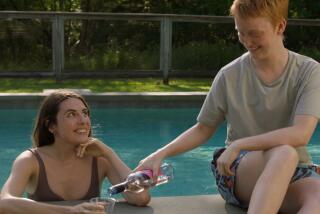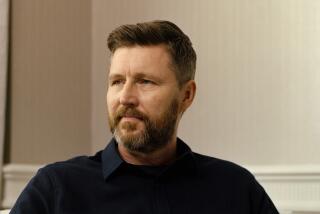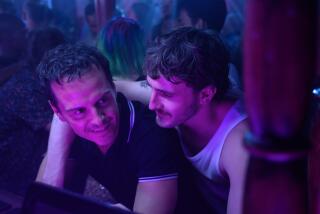Review: Gay romance ‘End of the Century’ captures the nuances of love and sex over time
“End of the Century,” the intriguingly told story of a romantic relationship between two men that spans 20 or so years, evokes Andrew Haigh’s fine “Weekend” as well as a kind of gay spin on Richard Linklater’s “Before” films. But this seductive drama, written, directed and edited by Lucio Castro in his feature debut, carves its own niche as an intimate, time-jumping look at life and love’s fortuitous twists and turns.
This is the type of cleverly assembled movie whose virtues, evident as they might be in a single unspooling, may be best appreciated a second time around, given the cache of subtleties, hints and puzzle pieces that Castro weaves into his often dreamlike scenario. To that end, although target audiences will likely be captivated by the film’s swoony, emotionally authentic elements, viewers are urged to pay close attention to the little things — they resonate.
The story unfolds largely in five unevenly spaced segments that move among the present, past and future. The first and perhaps most alluring part finds Ocho (Juan Barberini), an Argentine poet living in New York and vacationing alone in Barcelona, hooking up with Javi (Ramón Pujol), a Spaniard visiting from Berlin (where he works directing children’s television), after they spot each other on the beach and later near the Airbnb Ocho is renting.
A quick beer and some nominal getting-to-know you talk gives way to an urgently sexy interlude, though not before a gear-switching condom debate suggests the general difference between these two attractive strangers. But are they really strangers?
Later that day, on a lovely wine-with-a-view date, we and they learn more: Ocho recently exited a 20-year relationship with another man; Javi and his husband have an open marriage. Javi then reveals that he and Ocho have actually met before, something that has only suddenly — and, it should be said, not that plausibly — seemed to occur to Ocho, who’s maybe just been more consumed with his newfound sexual freedom and hot encounter with the fetching Javi.
Taking that conceit for what it is, we abruptly flash back 20 years to 1999. That’s when Ocho and Javi did, in fact, first meet through Ocho’s singer friend Sonia (Mía Maestro), who, at the time, was dating Javi. Though we’ll discover that the AIDS-phobic Ocho was also with women back then, both men were apparently questioning and closeted.
After a bonding day chatting and exploring Barcelona (the city is evocatively used throughout), Ocho and Javi end up sharing a wonderfully playful, tantalizing bro-dance to A Flock of Seagulls’ new-wave hit “Space Age Love Song.” Loosened up by the music, their moves and, of course, alcohol, the guys act on their palpable attraction. But they will prove to be proverbial ships in the night.
That Barberini and Pujol, with few physical adjustments, play their much-younger selves in this section is a bit distracting (would the 20-or-so Ocho really have Barberini’s graying hair?) but also a provocative choice that ultimately reinforces the film’s semi-surreal approach. An endearing thread involving a KISS T-shirt also factors in.
Castro lays out purposely shifting, at times inconsistent or contradictory character details in the present and past segments that are shuffled together to moving effect in the film’s third major movement. This one is set in a seemingly near future in which Ocho and Javi, ensconced in domestic warmth, are the fathers of a little girl.
Whether real or imagined, it’s a fitting arrangement for these two complementary men who, one way or another, seem meant to be in each other’s lives. Then again, are they truly destined — or is the whole thing just a credible sort of wish fulfillment?
Either way, we root for Ocho and Javi’s happiness; they’re good guys and they seem to deserve it.
Castro, with the help of his fine lead actors, nails so many of the relatable actions, reactions and nuances — the “chess game” of it all — that can occur between new or potential lovers, particularly gay ones. He also effectively captures the often fleeting choices and connections that lead us to grow, change and come into our own as adults, both younger and older. It’s a stirring and delicately reflective piece of work.
'End of the Century'
In Spanish with English subtitles
Not rated
Running time: 1 hour, 24 minutes
Playing: Starts Sept. 20, Landmark Nuart Theatre, West Los Angeles
More to Read
Only good movies
Get the Indie Focus newsletter, Mark Olsen's weekly guide to the world of cinema.
You may occasionally receive promotional content from the Los Angeles Times.










